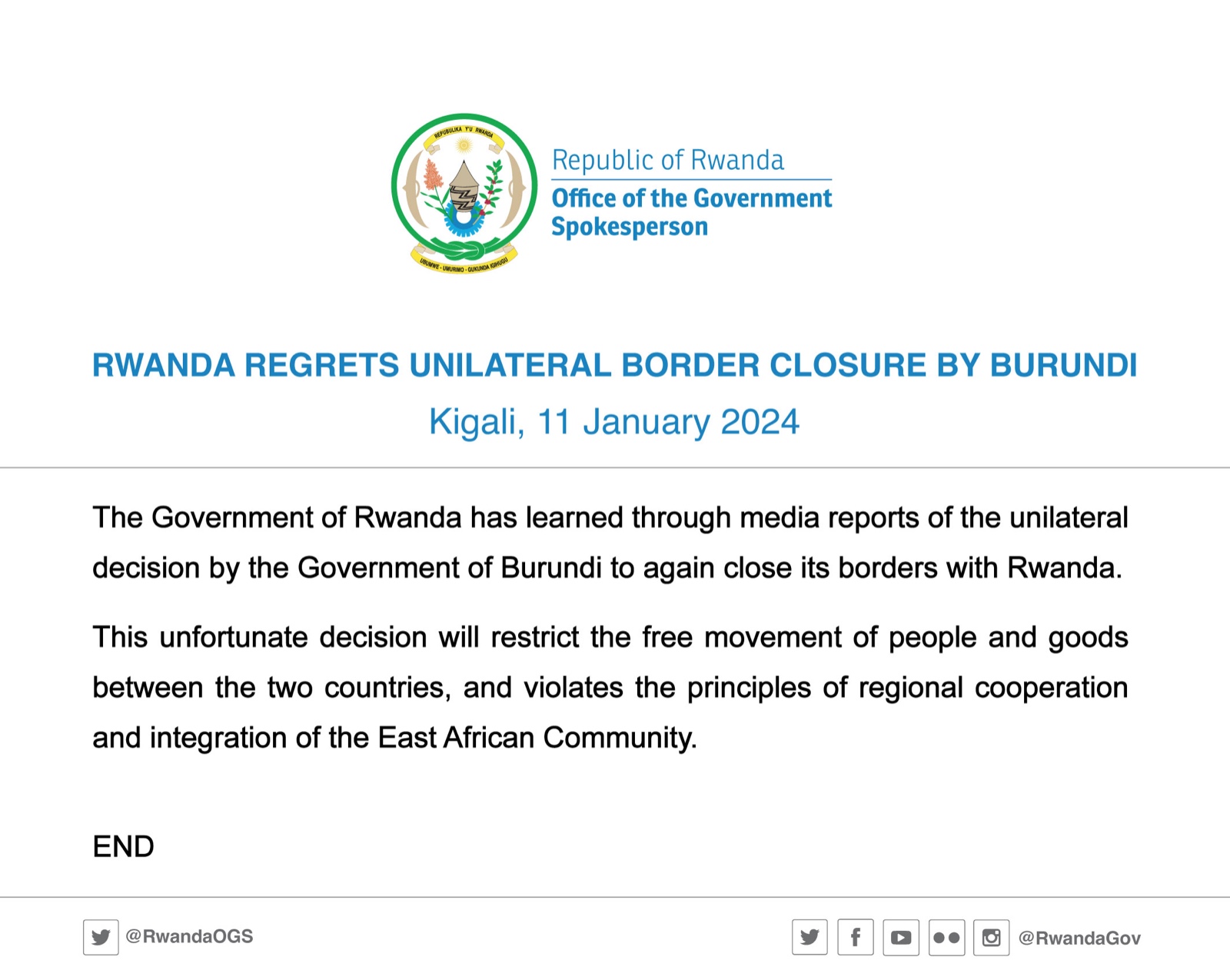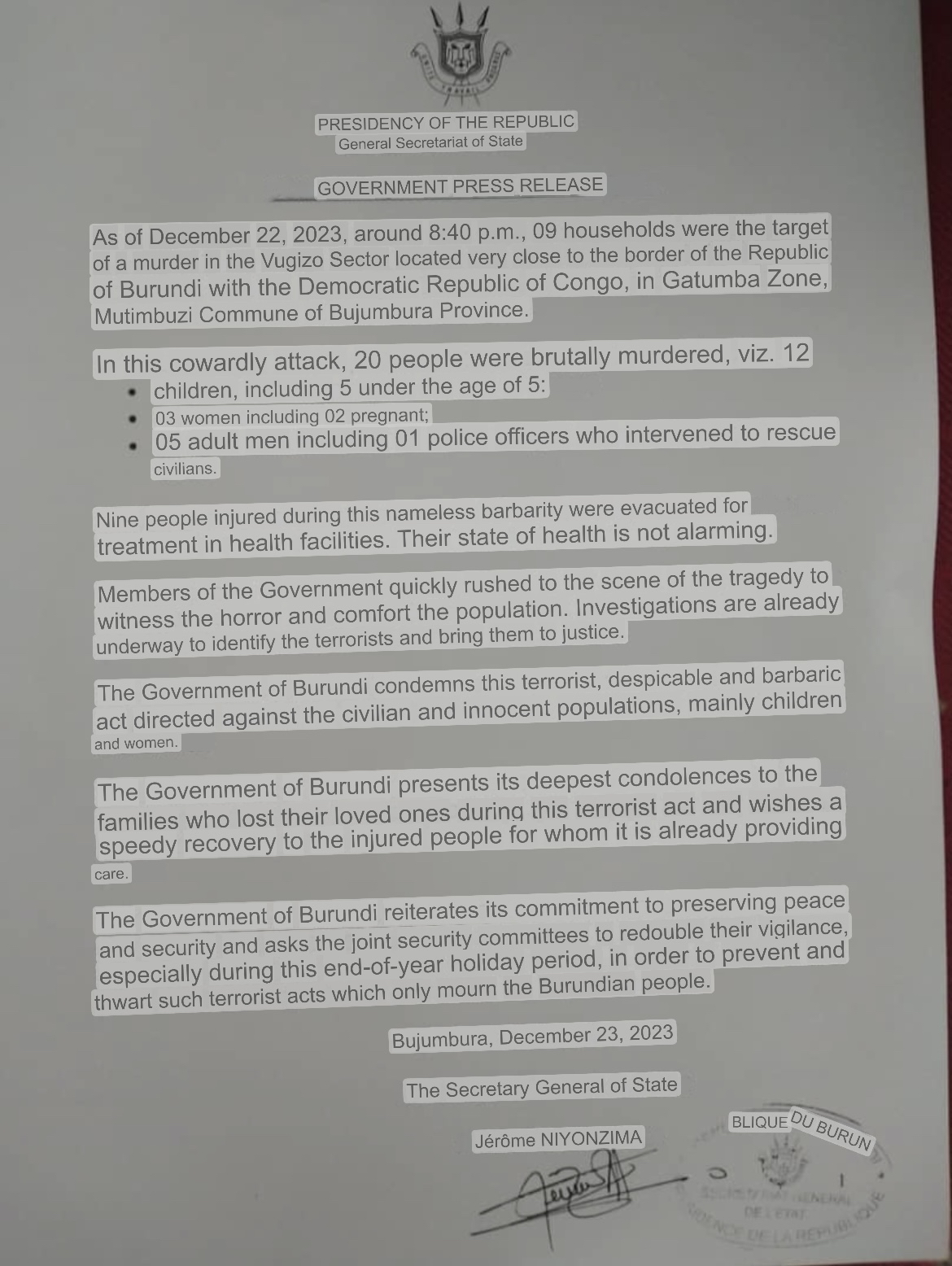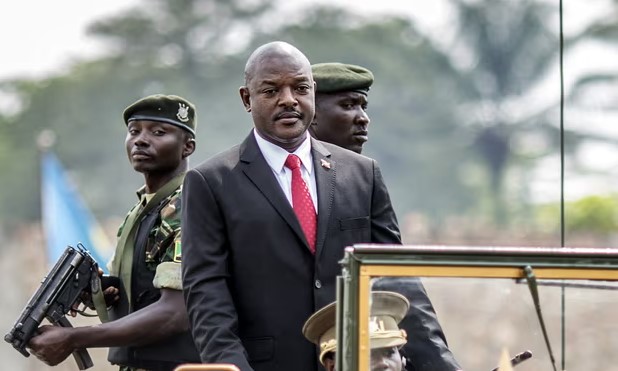Escalating Tensions
Relations between Rwanda and Burundi have reached a low point as the Government of Burundi has suspended ties with Rwanda, closed the Rwandan border, and “chased” out Rwandan nationals.
The move, which Rwanda says it only found out about from media reports, comes after Burundian President Evariste Ndayishimiye accused Rwanda of supporting the RED-Tabara rebel group, who was responsible for an attack in the Burundian town of Vugizo, which killed 20 people on December 22nd.
Internal Affairs Minister Martin Niteretse said today, January 11th, that “Paul Kagame is a bad neighbor … We have suspended all relations with him until he comes to his senses. He is harboring criminals who are destabilizing Burundi”. He further added that “All the borders are closed. We don’t need Rwandans here, and even those who were on our territory, we chased them out”.
The Rwandan government called Burundi’s decision to close the border “unfortunate”, adding that it “violates the principles of regional cooperation and integration of the East African Community”. Both Burundi and Rwanda are in the East African Community (EAC), a bloc which, within a few years, hopes to integrate into one nation, known as the East African Federation. The bloc presently includes Burundi, Rwanda, Tanzania, Kenya, Uganda, the Democratic Republic of the Congo (DRC), South Sudan, and Somalia.

Rwanda faces a similar issue with the DRC, where it is accused of supporting the M23 rebellion.
Notably, Rwanda’s statement on the border closure does not mention the suspension of relations nor that the Internal Affairs Minister stated they “chased” Rwandan nationals out of the country.
Rwanda has continually denied support for RED-Tabara, stating they are “not associated, in any way, with any Burundian armed group”. In a statement dated December 29th, 2023, the Rwandan government noted that “it should be recalled that, in the spirit of mutual cooperation, the Government of Rwanda has previously handed over, through the Expanded Joint Verification Mechanism, Burundian combatants who illegally crossed into Rwanda”, adding that the “Government of Rwanda urges the Government of Burundi to address their concerns through diplomatic channels where they can be resolved amicably”.
Several Rwandans and Burundians have reported being turned back from Burundi’s border with Rwanda or denied entry from Rwanda into Burundi, regardless of their nationality or place of living.
Old Issues Resurfacing
Tensions between Rwanda and Burundi have historically always been tense. Significant ground has been made in restoring relations between the two EAC nations, largely since the election of President Ndayishimiye. Relations were severed and the border closed in 2015 after a coup attempt in Burundi failed, and Burundi accused Rwanda of supporting the coup and harbouring some of its perpetrators. Relations began being restored in 2020, with the border finally reopened in 2022.
Burundi has accused Rwanda of supporting RED-Tabara since the groups founding in 2011.
The Attack
The attack which Rwanda and Burundi have entered this diplomatic spat over took place on December 22nd, close to Burundi’s border with the DRC. The attack, according to the government and several international sources, killed 19 civilians, including 12 children, and one policeman. Following the attack, the RED-Tabara militants crossed back into the DRC, where the group is largely based.

RED-Tabara, while claiming responsibility for the attack, denied that it had killed any civilians, instead claiming that it had killed nine military servicemen and one policeman.
What is RED-Tabara
RED-Tabara is Burundi’s most prominent rebel group. Originally created in 2011 following the 2010 elections (which they had determined to be fraudulent), and gaining significant traction in 2015 during the widespread protest movement against at the time President Pierre Nkurunziza, after it was announced he would be running for a third term, when the nations constitution only allowed for two terms.
On May 5th, 2015, after 4 out of 7 judges on the nations’ Constitutional Court had fled the country following what they claimed were death threats from member of the government, the remaining 3 judges approved Nkurunziza’s candidacy, stating it does not go against the constitution.

On the 13th of May, 2015, a coup attempt took place, seeking to overthrow Nkurunziza. While it failed (despite apparent widespread public support), RED-Tabara’s ranks were bolstered by some of those radicalized against the government during the protests, which saw a harsh crackdown in which many protestors were killed or injured and internet/phone networks were cut nationwide, as well as some military members involved or sympathetic to the coup attempt.
RED-Tabara over the course of their history has launched a number of significant attacks in Burundi. While they do not carry enough force to potentially dislodge the government, they have made enough of an impact for the government to carry out several hundred arrests of people allegedly connected with RED-Tabara, as well as other armed groups operating against the government.
The group’s presence has significantly toned down since 2021, largely operating since within the DRC, however this attack marks the second on Burundi this December.
RED-Tabara claims to have never killed civilians in their attacks, however the government has made repeated claims of killings and abuses by RED-Tabara.


